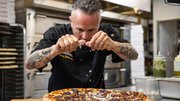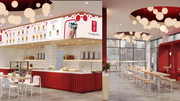Article
Will the falafel be fast casual's next big thing?
Arianne and Scott Bennett say consumers will embrace unique food if presented to them correctly.

September 10, 2013 by Cherryh Cansler — Editor, FastCasual.com
After touring Amsterdam and indulging in the country's many falafel shops, husband and wife, Arianne and Scott Bennett, decided to bring the cuisine back to The States.
"We fell in love with the idea of creating a top-it-yourself falafel shop here in the United States," said Arianne Bennett, who founded Amsterdam Falafelshop in Washington D.C. in 2004 with Scott. "We worked very hard to obtain a Small Business Administration loan, conducting a great amount of research on the matter. It paid off — we were able to convince our bank that this was indeed a great opportunity. They believed in us and gave us a loan."
Initially, the duo anticipated Amsterdam Falafelshop being a small endeavor and created the concept for people who needed a quick bite but who wanted something unique and different. They also wanted to open a restaurant for the late-night crowd.
"We ultimately decided to expand because of how very popular we became and how many people kept saying to us: 'I would love to open this. Are you considering franchising,'" Arianne said. "So, we began crafting a way to feed into this type of scene — to create an option for people serious about investing."
That strategy has led to three locations with multiple units in development and plans for an exponential increase in franchised sister-shops, adding dozens of Amsterdam Falafelshop franchise locations across urban centers nationwide.
"Truthfully, most of the fast food that we find out there is ordinary," Arianne said. "There are very few places that really step up and bring the flavor. The few of those that do, we love. But not many are doing that. We want to have flavorful food — the kind of food people can't stop talking about."
 |
| Arianne and Scott Bennett |
Handing over control
Customization is a huge part of the chain's success, said Arianne, who believes concepts where servers top sandwiches with condiments and sauces for the guest can create anxiety in the mind of the customer.
"People might fear that the sandwich maker is going to put on more sauce than what was asked for, or in the wrong place. They lack any control," she said. "Putting the control into the consumers' hands is a fundamental sell of our franchise concept."
It also breaks down barriers for people who are not familiar with the food.
"People want to sample, they want to test — they want to make sure they like certain flavor combinations, and by inviting guest participation in the assembly process, it enriches the customer experience," Arianne said.
Amsterdam Falafelshop's staff is trained to encourage customers to try things ahead of time to make sure they like it. The top-it-yourself bar with nearly two-dozen ingredients and sauces also helps customers get what they want.
"It lures them into mysterious tastes and generates a great deal of excitement about our shop," Arianne said.
Creating the ambiance
Besides having a 100-percent customizable menu, Arianne said what also distinguishes Amsterdam Falafelshop from competitors is the environment she and Scott worked so hard to design. (Click here to see a slideshow of photos.)
"Yes; we have posters and murals and eye candy, but we also hire employees who engage and talk with customers," she said. "We don't just say 'Can I take your order?' There is some signage, but not everything is on a sign," she said. "We want you to feel as if you have connected with us in a meaningful way."
Each location is independently owned and operated and reflects the vibe of its community.
"We do not put our people in uniforms because they are from the community, and we do not want to hide their personality — we want guests to get to know them," Arianne said. "We've successfully done it in Boston and Annapolis — and there are close to a dozen new units in development throughout Washington D.C., Boston and Salt Lake City. We're excited about continued expansion with the right franchise owners."
Arianne said it's important to find franchise operators who are engaged with the community but who also grasp the chain's overall business goals and strategies.
"We want each and every new franchise shop to follow our recipe while maintaining a distinct individuality and tie to the local community," she said.
Taking it to the streets
Although Arianne admits that falafels aren't exactly mainstream, yet, in America, she believes her concept will thrive across the nation's urban centers.
"We're not the only ones using falafel. People are talking about it — falafel is becoming more known. Plus, you're seeing unique and interesting foods on the Food Network. Americans are more interested than ever in trying different foods, and are tired of the ordinary," she said.
Marketing correctly is key to getting the public to embrace unique foods, like the falafel.
"It has to be encased in a visual package where people are seeing it made in front of them and they are not afraid of what's being made in the kitchen. That's how we operate at Amsterdam Falafelshop," she said.
So far, the chain's reputation for fresh, good food has done most of the marketing for the business.
"We have managed to go viral with very limited paid advertising," Arianne said. "The ads we do buy tend to be centered on college campuses and tourists. The rest is naturally grown. We've gotten great accolades through Yelp, as people have given us truly great reviews. We place tops in competitions we participate in — and more tremendous word of mouth buzz spreads that way. Also, great reviews by food critics have provided us an incredible boost."
The clamor for healthy, unprocessed food is also creating a demand for restaurants like Amsterdam Falafelshop.
"Our philosophy for our fast casual franchise concept starts with food quality. The profit model has followed and has been very strong aided in large part by the fact that chickpeas — not chicken or beef — is our main ingredient," Arianne said. "This, coupled with a simple-to-operate concept, makes our operating costs attractive to franchise investors. Focusing on food first has validated that when a concept creates great food consistently, a great profit model can follow.
"In short, the unit economics make sense with our concept. It starts with the food."
Read more about growth.
 ChatGPT
ChatGPT Grok
Grok Perplexity
Perplexity Claude
Claude












